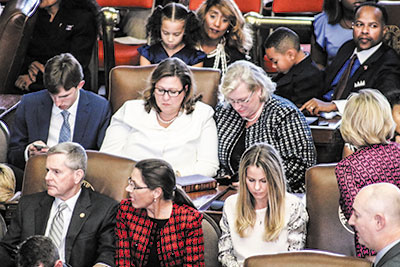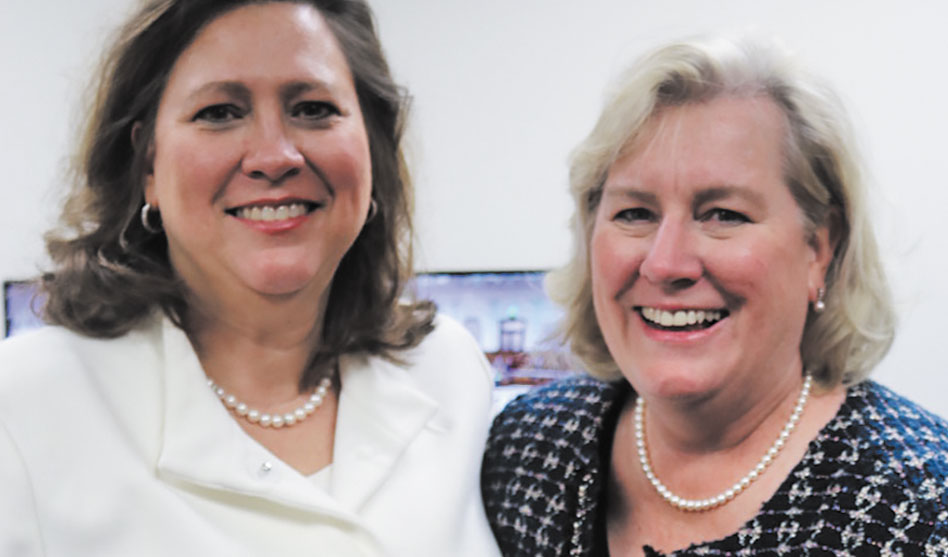State Rep. Julie Johnson and her wife, Dr. Sue Moster
State Rep. Julie Johnson hopes to become the first out congressperson from the South
DAVID TAFFET | Senior Staff Writer
taffet@dallasvoice.com
Experience counts, state Rep. Julie Johnson said, and that sets her apart from others who have announced they plan to run for the congressional seat being vacated by Rep. Colin Allred. Rather than seek re-election to the U.S. House of Representatives, Allred is challenging Ted Cruz, who is running for his third term in the U.S. Senate in the November 2024 election.
Johnson, currently serving her third term in the Texas House of Representatives, came to office when she defeated state Rep. Matt Rinaldi, author of an anti-transgender bathroom bill that never passed in the Texas Legislature. Like her opponent, Johnson was interested in what went on in the state’s public schools.
But rather than concentrate on the bathroom, she focused on the classroom. That earned her the endorsement of school officials across her Northwest Dallas County district.
Johnson took office along with state Rep. Jessica Gonzalez, also representing a Dallas County district, and, with three other LGBTQ representatives from around the state, they formed the LGBT Caucus, a first for any legislature across the South.
In her race for Congress, Johnson is stressing that her experience in government matters.
When the balance of power between Democrats and Republicans is razor thin, she said, that’s no time for an unproven candidate with no experience in fundraising and little or no name recognition to run.
Johnson said she expects her campaign for the Congressional District 32 seat to represent more than 800,000 constituents to be expensive. While Allred, the two-term incumbent, is a Democrat, the seat was held by a Republican for years. But Johnson believes she is up for the financial challenge. In the Texas House, she was respected on both sides of the aisle for her ability to raise funds.

State Rep.Julie Johnson,center, at her desk on the House floor with her wife, Dr. Sue Moster, and their son, left. (David Taffet/Dallas Voice)
On the issues
Johnson isn’t hesitant to speak her mind, and that includes when talk turns to the recent impeachment of Texas Attorney General Ken Paxton and the unsuccessful effort in the state Senate to convict him. Johnson said she wasn’t surprised by the outcome.
“Give someone $3 million and look what happens,” Johnson said, referring to a contribution by Paxton supporters to Lt. Gov. Dan Patrick’s campaign account about a week before the Senate trial opened — with Patrick presiding.
“And then … Oh! … I’m going to have some ethics and not take any contributions during the trial,” she said. “But a few days before …?”
But why did all but two senate Republicans vote to acquit?
“Three million dollars,” she repeated.
Among Johnson’s top issues is education. It’s been her priority in the state House, and she plans to take the issue along with her to Washington, if elected.
“Public education is one of the most important functions of government,” she said.
Johnson said she expects the governor to call a special session sometime this fall to address education funding. The lieutenant governor’s plan that she expects to come out of the Senate includes vouchers, but Johnson doesn’t believe the House — which voted overwhelmingly to impeach Paxton — will be in much of a mood to cave in to Patrick after Paxton’s acquittal. She thinks a coalition of Democrats and rural Republicans will stave off any voucher plan.
“The House already doesn’t have a proclivity to support vouchers,” she said.
Rural areas, mostly represented by Republicans, don’t have private schools where they can use vouchers. So a plan that diverts money from public schools will hurt them. Those areas strongly support their public schools — and their schools’ football teams. So taking money away from public education is very unpopular in rural areas of the state, she said.
Healthcare is another of Johnson’s top priorities. As a member of Congress, she said she would push to expand Medicaid across the country. Texas is losing billions of dollars, she said, by refusing to expand the program.
“It’s irresponsible,” Johnson said. “It would provide an $8 billion budget surplus.”
One bill Johnson passed in the state House was inspired, she said, by her wife. She recalled how, one evening, she listened to her wife, Dr. Sue Moster, argue with an insurance company for an hour-and-a-half about getting a reauthorization for a drug for her patient. And she has to do it several times a year no matter how long a patient has been on the medication.
At the time, Johnson was trying to pass a bill dealing with reauthorization for HIV medications. She spoke to some of her Republican colleagues about the issue, and, generally, they were in favor of the idea of having to reauthorize medication just once a year. But at the same time, they preferred not to vote for AIDS legislation. When they removed the word “AIDS” from the bill’s language and just included all medications for diseases related to immune disorders, the bill passed.
Johnson said she was proud of that legislation because, “It’s going to help people stay on their meds.”
“There are so many barriers to care,” she continued. “When somebody you love is in an acute healthcare crisis, there’s nothing more important to you than getting healthcare.”
LGBTQ issues are certainly as important to Johnson as education and healthcare, and she was outraged by the trans healthcare ban that passed in this year’s session of the Legislature, making it illegal to provide gender-affirming healthcare to trans people under the age of 18.
“Did we ever envision a time, say, 15 years ago when the government would say, ‘We know more than parents do about healthcare for your kids?’” she demanded. “Did we ever see that coming? It’s unconscionable the way the far right has inserted themselves into the doctor-parent relationship.”
Johnson spreads out the blame for passage of the healthcare ban.
“I don’t think doctors scream out enough about it,” she said. “If you’re a parent of a trans child in Texas, it’s a scary, scary place.”
Representing her community
In every interview Johnson’s done since announcing her candidacy for Congress, if the interviewer hasn’t brought up her sexual orientation and LGBTQ rights, Johnson addresses the issue herself. She’s married to Dr. Sue Moster, a gastroenterologist who practices in Southlake. They have two sons, ages 20 and 23.
Johnson was the first LGBTQ representative in Texas with a spouse, and Moster became a proud member of the Legislative Ladies, a group for spouses of Texas representatives and senators. In her three terms as a member of the spousal group, Moster made such an impression on other members of the organization, she was asked to be president of the group next legislative session. So Moster is a little disappointed her wife won’t be back in Austin next session.
But Johnson said she decided to run when “several people reached out to me.” She said she’s aware of what electing a lesbian “symbolizes for our community,” especially in a state that she called “the epicenter of anti-LGBT legislation.”
She knows she’ll face a number of opponents in her primary, but she said that of those who’ve announced they plan to run, she’s the only one who’s ever won an election.
[EDITOR’S NOTE: After this interview with Johnson, state Rep. Rhetta Bowers announced she is running for Allred’s seat.]
And, she stressed again, her experience counts.
“There’s a reason so many members of Congress come from their state legislatures,” she said. “Experience matters.”













